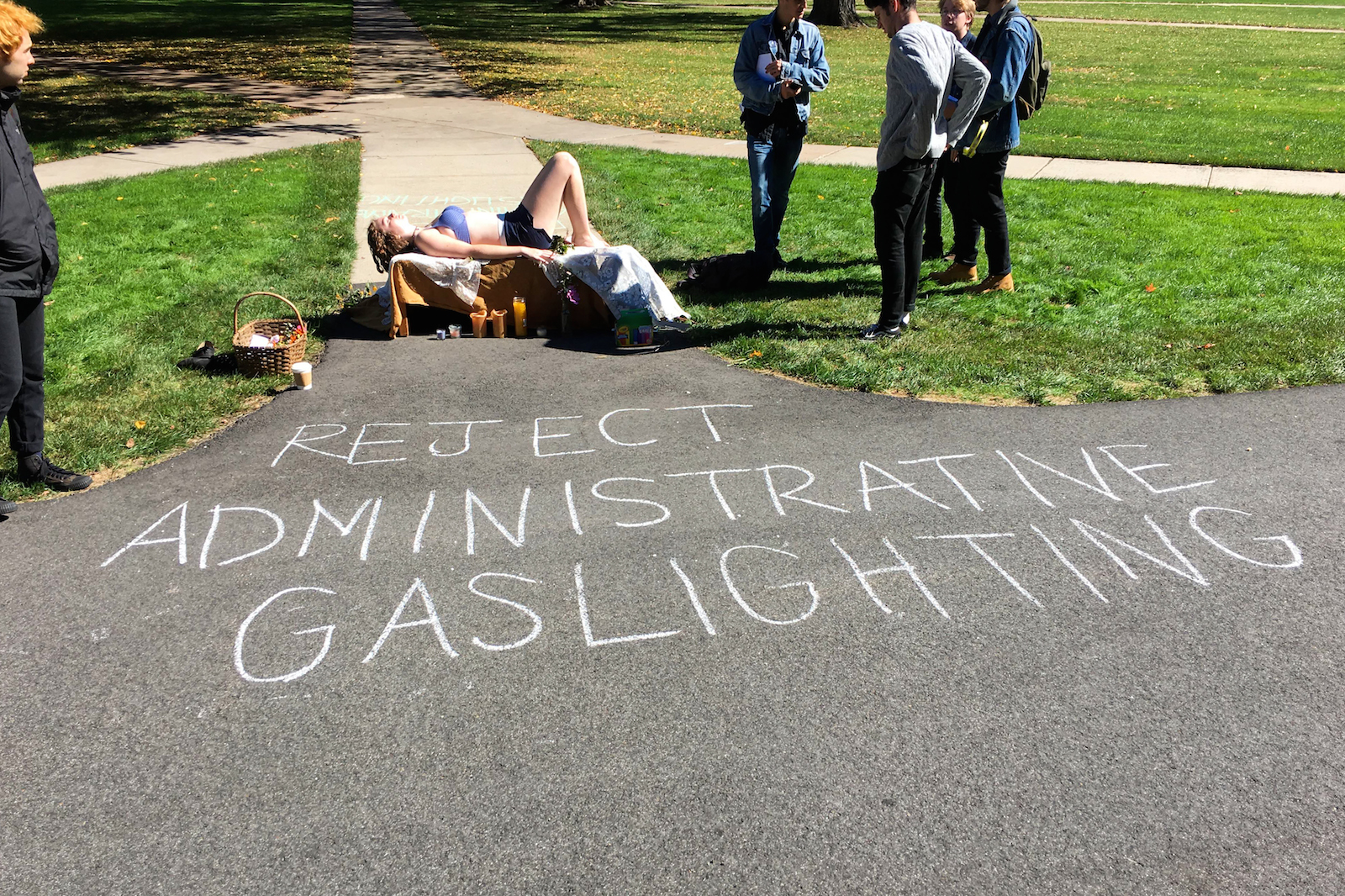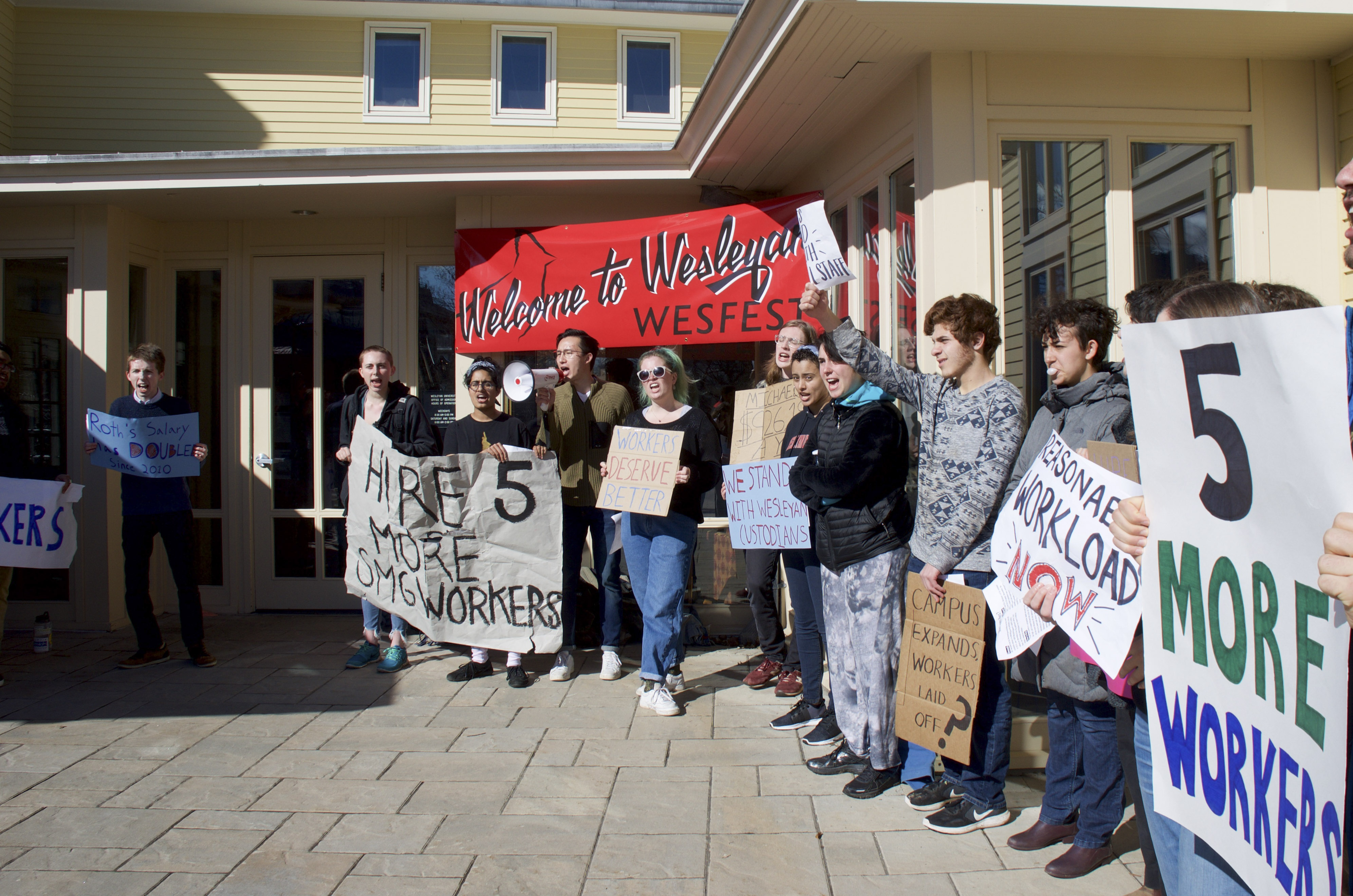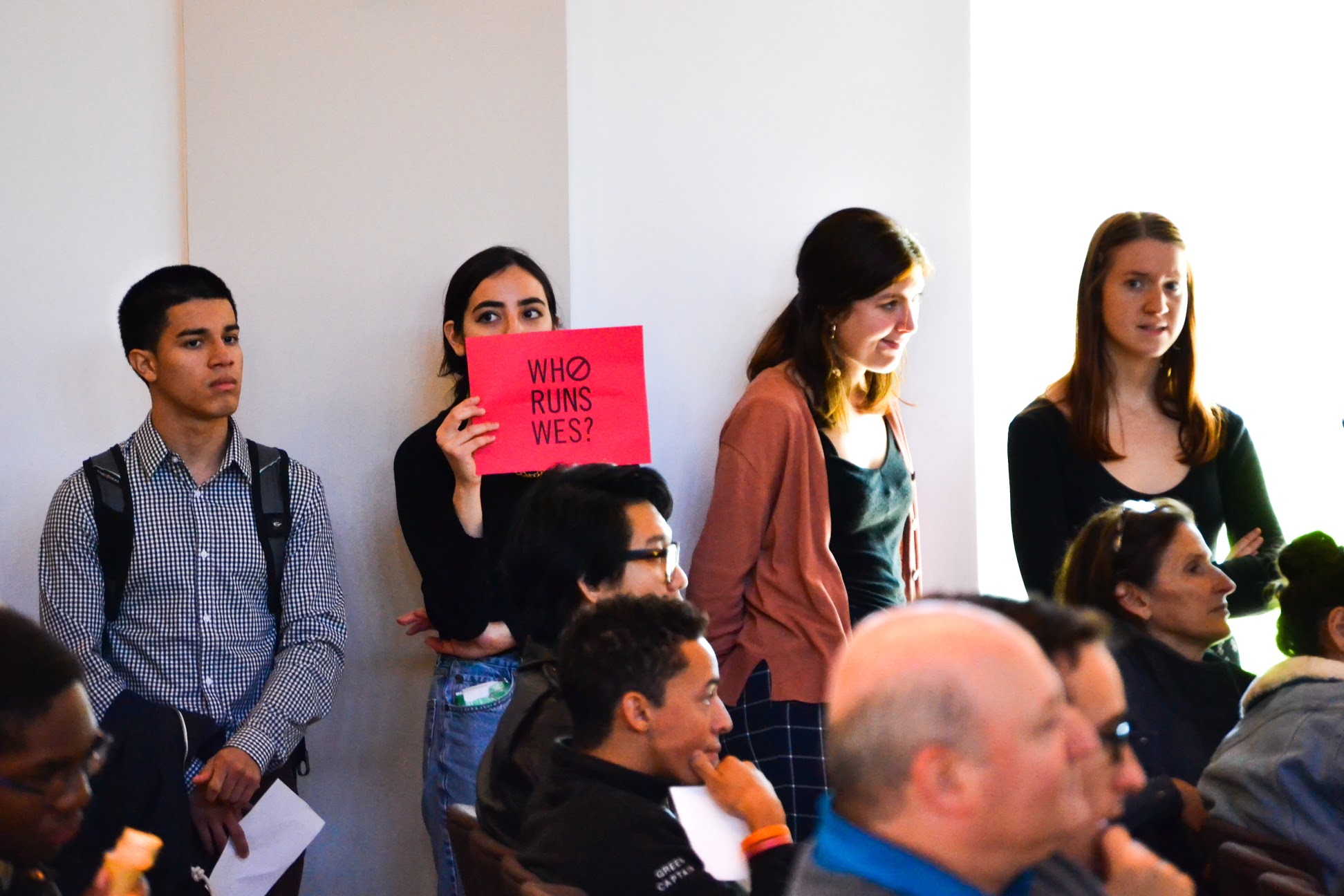
c/o The Argus
Colorful chalk messages, ranging in intensity from the likes of “I Love Usdan” to “Wesleyan Ostracizes Faculty of Color,” have decorated campus sidewalks in recent weeks. These slogans are an impromptu protest against the University’s current chalking ban, appearing during WesFest, the annual welcoming event for admitted students on campus.
Historically, admitted students’ days have been a peak time for student organizing on campus; many have taken advantage of this larger audience when planning rallies and demonstrations against University policies. Intrigued by the colorful history of unrest during WesFest on campus, I took a look through the Argives this week to examine some snapshots of the University’s history of protest during admitted student activities through the years.
2008: (Physically) Planting the Seeds of Change
In 2008, prefrosh activities were interrupted by protests led by Physical Plant workers fighting for a new contract. According to an article titled “‘No Wesploitation’: Physical Plant workers protest contract” by then-Staff Writer Rob Wohl ’11, the protest culminated in a march from College Row to the Physical Plant headquarters near Long Lane Farm.
The protest itself focused on supporting Physical Plant workers financially, who said that the contract that the University had rejected would give these workers a livable wage. This protest came after a long battle with administrators over this contract.
“Ten months of negotiations have passed with limited compromises from the administration,” Alexis Horan ’10, a member of United Student Labor Action Coalition (USLAC) and one of the demonstration’s organizers, said in the article. “That’s been possible because it’s been invisible. We are going to let Wesleyan know that students care about workers.”
As the protest was conveniently planned during WesFest, according to Wohl’s article, a handful of admitted students joined the protest at some point during its course, especially because organizers designed the march’s route to be as unavoidable as possible to both current and prospective students.
“For maximum visibility, the group passed by the Office of Admission and crossed Foss Hill,” Wohl wrote.
This protest, along with many in recent history, prominently featured chalk.
“Students broke from the group to chalk the union’s demands on walls and sidewalks,” Wohl wrote. “The entrance to the Physical Plant offices was covered in expressions of solidarity from students and the slogan ‘No Wesploitation.’”
As prefrosh navigated an admitted students’ day on a campus colorful with chalk and loud with the chants of student and staff protestors, they perhaps got a more authentic look at the University’s culture than the carefully-curated WesFest programming could have given them.

c/o Dani Smotrich-Bar
2016: Anti-Administration Action
Between 2008 and 2016, student activists seemed to have upped their WesFest protest game. Demonstrations in 2016 included disruptions to tours, demonstrations and chalking in front of College Row, and a takeover of President Michael Roth ’78’s address to prospective students, in addition to various signs and installations around campus.
According to an article titled “At Admissions Open House, Protesters Disrupt Tours, Take Over Roth Talk” by then-Editor-in-Chief, News Editor, & Features Editor Jenny Davis ’17, Aaron Stagoff Belfort ’18, and Jake Lahut ’17, these protests broadly criticized the University’s administration, focusing on Title IX policies, support for underrepresented perspectives, repatriation of indigenous remains, Roth’s salary, and the administration’s attentiveness to student voices.
“The University will try to commodify our protest to contribute to their brand of ‘Diversity University,’” Chris Gortmaker ’17 said in the 2016 article. “We’re telling the people we’re talking to that [the University] will try this, and that we’re doing this not to contribute to this brand, but to operate in spite of it and against it.”
The first demonstrations featured protestors interrupting tour groups as they passed through various locations on campus with an anti-administration spiel. Unfortunately for protestors, admissions workers quickly learned of these protests and ordered their employees to avoid them.
“We were told that the center of protesting seemed to be in Exley, and therefore to avoid that stop on the tour altogether and instead discuss the sciences while still in Olin,” an anonymous tour guide said in the 2016 article. “When I went to lead my tour group out of Olin, the protesters actually stood in front of the door, physically preventing us from leaving so that they could talk to the visitors. At the end of our tour, while we were standing in Usdan finishing up, a few protesters started shouting over mine and another guide’s voice as we attempted to finish up the last few minutes of the tour.”
Other protests during this WesFest included a performance art installation in front of College Row.
“Positioned in front of chalking on the ground that read ‘reject administrative gaslighting,’ various nearly nude students took turns lying down with their eyes on an altar surrounded by candles and flowers in vases,” Davis, Stagoff Belfort, and Lahut wrote.
These protestors aimed to criticize the administration’s perceived focus on reputation over actual student concerns, particularly in the case of Title IX processes and sexual assault.
“The symbolic meaning of this protest is that the University sacrifices victims of sexual assault in the name of its own image and reputation,” Michelle Fisher ’19 said in the 2016 article. “We wanted to make the symbolic image of our pain visible.”
Perhaps the most impressive of the day’s protests was a full-scale takeover of Roth’s talk to admitted students and their families. According to the 2016 article, roughly 45 protestors filed into Beckham Hall and lined its perimeter in silence at the onset of Roth’s presentation, eventually leading Roth to end his talk and leave the hall after just 9 minutes of speaking. After Roth exited, surrounded by the unspeaking protestors, one of the activists began facilitating her own Q&A session with the admitted students and their parents that had planned to attend Roth’s session.
“Michael Roth left,” Avigayl Sharp ’17 said in the 2016 article. “The protest made him really uncomfortable, and he left a roomful of prospective students and their parents sitting there without giving them the time he had promised them, which I think is so indicative of the silencing and the inability to account for the actions we are calling out.”

c/o The Argus
2019: Calls for Custodians and a Defense of Disruption
In 2019, Roth’s WesFest speech was also met with action from student protestors (though it seems as though Roth has grown a slightly thicker shell in the years since 2016). According to an article titled “USLAC Leads Multi-Day Protest Demanding Custodial Hires” by then-Assistant News Editor and Staff Writer Jocelyn Maeyama and Jordan Saliby, these protests focused on demanding that the University hire five more custodial workers in order to ensure that custodial staff were not overworked.
This protest came after a 10-person reduction in the University’s custodial staff, and garnered support from both students and staff members on campus.
“We can have Physical Plant workers come and protest with us in solidarity, their union come and protest with us in solidarity, and the Connecticut Chapter of the IWW [Industrial Workers of the World] come and protest with us in solidarity, and Roth still claims that there’s no overworking because he received internal data, because they’re meeting codes,” an anonymous custodial worker said in the 2019 article. “Our point is not that they’re doing something illegal—that has never been our point, that has never been our claim. Our claim is that SMG as a company is very good at meeting standards and meeting the laws, but still screwing people over.”
Protestors gathered outside the Office of Admissions, armed with a plethora of signs and chants, and blocked the entrances to the building until they were forced to move aside by Public Safety officers in order to allow prospective students to enter and exit the building.
Another group of protestors silently stood both in front of and on the stage of Beckham Hall, where Roth was slated to give an address; this time, instead of exiting the building, Roth adapted to this situation by giving his speech while walking through the crowd, according to the 2016 article. The following day, at another of Roth’s addresses in the same building, protestors gathered once again, this time chanting; many attendees thus left the building and Roth was prompted to finish his address outside.
Protestors subsequently interrupted many other events that day with chants and signs, including an Office of Residential Life panel, a Parent-to-Parent panel, and a keynote alumni address by Marysol Castro ’96. All of these protests were met with resistance from Public Safety officers.
“As the protesters were escorted down the stairs by Public Safety officers, who at times used physical force, they continued chanting until they were ushered out of the building and the doors were locked behind them,” Maeyama and Saliby wrote. “They regrouped, then continued chanting outside, directing their demands to the building’s windows and urging those listening to call Roth’s work number to show their support for the protesters.”
According to the 2019 article, administrators threatened disciplinary action against any and all students involved in the various protests during that year’s WesFest events. However, student activists were not deterred by this proclamation.
“I think what they don’t realize is, it’s not 10 people doing this, it’s not 20 people doing this, it’s not even 80 people doing this, it’s not even a hundred people doing this, it’s a lot more than that,” an anonymous activist said. “So every day of WesFest you will have new faces at every single action. They will not stop us, they cannot write every single one of us up.”
And WesFest protestors have yet to be stopped, judging from this year’s University-wide chalking demonstration. And perhaps this tradition of protest during WesFest is the administration’s secret weapon. In his 2019 piece “If You’re Annoyed by Student Protests…They’re Working,” then-Opinion Editor Connor Aberle ’19 leaves us with some important insight.
“Wesleyan avoids confronting student concerns by commodifying protest as a novelty,” Aberle wrote. “The administration twists these actions into a cultivated aesthetic; Wesleyan University likes to bill itself as a progressive institution. Brochures may have you believe that everyone is a vegan who drives a Prius and wears Birkenstocks. The University is a business, and it’s selling this image to potential students (or rather, customers). If the administrative apparatus can contort student demonstrations into a marketing tool, it will.”
According to Aberle, the 2019 protests were unique in their disruption, visibility, and prominence; however, their potentially annoying nature only means they were effective in making the administration’s efforts to use these protests as a marketing tool impossible.
“WesFest demonstrations threaten Wesleyan’s investments, which is why the University attempts to market student protests as positive reflections of the school,” Aberle wrote. “Constant disruption doesn’t lend itself well to marketing, however. The issue of Wesleyan’s mistreatment of custodians is unavoidable if you spend any time on campus during WesFest. The University’s inability to hold events without protest could discourage admitted students from attending, which may cost the University millions of dollars down the line. If potential students are frustrated, that only means the protest is effective.”
Akhil Joondeph can be reached at ajoondeph@wesleyan.edu.
“From the Argives” is a column that explores The Argus’ archives (Argives) and any interesting, topical, poignant, or comical stories that have been published in the past. Given The Argus’ long history on campus and the ever-shifting viewpoints of its student body, the material, subject matter, and perspectives expressed in the archived article may be insensitive or outdated, and do not reflect the views of any current member of The Argus. If you have any questions about the original article or its publication, please contact Head Archivist Sam Hilton at shilton@wesleyan.edu.
Comments are closed